
Hoverflies, also called flower flies or syrphids, make up the insect family Syrphidae. As their common name suggests, they are often seen hovering or nectaring at flowers; the adults of many species feed mainly on nectar and pollen, while the larvae (maggots) eat a wide range of foods. In some species, the larvae are saprotrophs, eating decaying plant and animal matter in the soil or in ponds and streams. In other species, the larvae are insectivores, preying on aphids, thrips, and other plant-sucking insects.

Eristalinae are one of the four subfamilies of the fly family Syrphidae, or hoverflies. A well-known species included in this subfamily is the dronefly, Eristalis tenax.
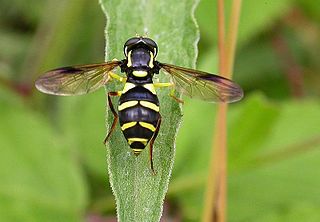
Philhelius are moderate to large hoverflies, most are somewhat wasp like. Little is known of their biology. Prior to 2018, they were known under the genus name Xanthogramma, a junior synonym.
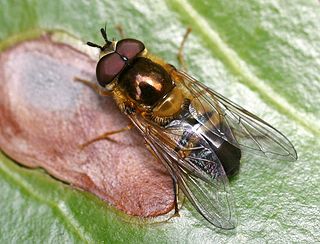
Epistrophe is a genus of flies in the family Syrphidae, the hoverflies or flower flies.

Scaeva selenitica is a species of hoverfly.

Sphaerophoria is a genus of hoverflies. Species slender 5.6-12mm long with extremely large hemispherical male terminalia after which the common name globetail has been created. There are bright yellow markings on head and thorax and usually on the abdomen but some species have a black abdomen. They can be found worldwide but are common in North America, Europe, Asia and Australia. There are over 73 described species.

Sphaerophoria scripta, the long hoverfly, is a species of hoverfly belonging to the family Syrphidae.
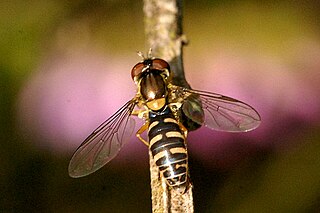
Sphaerophoria fatarum is a European species of hoverfly.

Baccha elongata is a species of hoverfly in the genus Baccha.

Xanthandrus comtus is a species of hoverfly. It is found in the Palearctic.
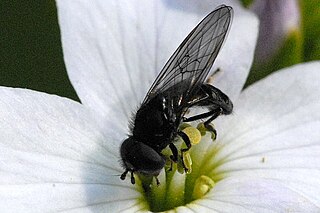
Triglyphus primus is a species of hoverfly, from the family Syrphidae, in the order Diptera. The larvae seem to be host-specific to an aphid species Cryptosiphum artemisiae which creates galls on Mugwort Artemisia vulgaris.

Pipizini is a tribe of small to medium-sized generally black hoverflies, although some species also have orange spots on their abdomen. This nondescript colouring can lead to some species being confused with other dark hoverflies from other tribes. The lack of a facial knob is a good defining feature which separates them from most of these other hoverflies. As with other species in the subfamily Syrphinae the larvae feed on aphids though there seems to be a preference for wax-secreting aphids e.g. Pemphigidae.

Chrysotoxum arcuatum, is a species of hoverfly. It is widespread throughout Britain and Ireland but much more common in the upland districts of the north and west where it is typically found at ground level near woodland and moorland edges. The larvae are thought to feed on root aphids associated with ant colonies.
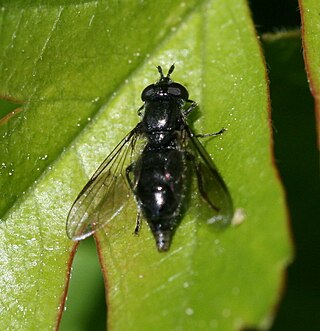
Pipiza austriaca is a species of hoverfly, from the family Syrphidae, in the order Diptera.
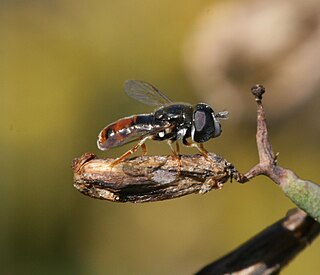
Paragus tibialis, is a species of hoverfly found in many parts of Europe and North Africa. It has a preference for drier areas and its larvae feed on root aphids.

Eumerus funeralis or lesser bulb fly is a species of Hoverfly, from the family Syrphidae, in the order Diptera. E. funeralis appears in Peck (1988) as a synonym of E. strigatus (Fallen), but was reinstated as the correct name for tuberculatus Rondani, sensu auctorum by Speight et al. (1998).
Scaeva albomaculata is a European species of hoverfly.
Sphaerophoria bankowskae is a European species of hoverfly.
Eupeodes nielseni is a Palearctic hoverfly.
















